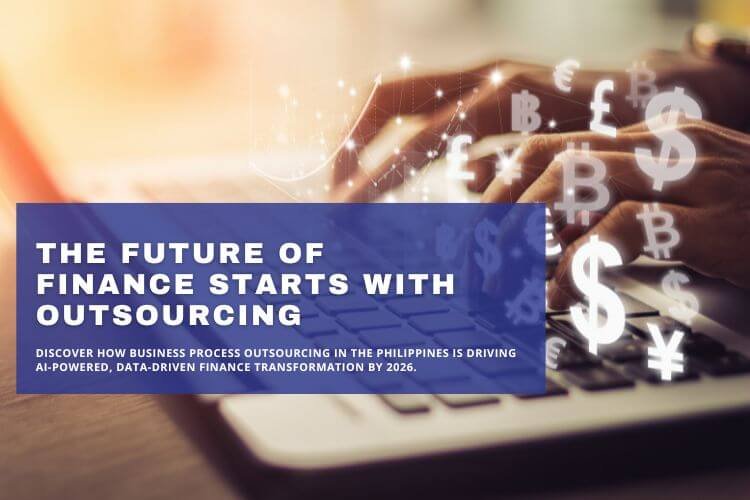The global finance landscape is in the middle of a seismic shift. According to Gartner, nearly 72% of CFOs are focused on transforming their technology and data analytics capabilities. The traditional finance department—buried in spreadsheets, manual data entry, and historical reporting—is no longer competitive. It’s too slow, too expensive, and too reactive for a digital-first economy.
This urgent need for change leads to a critical question for business leaders: Why will outsourcing dominate digital finance transformation by 2026?
The answer is simple: transformation is complex and expensive. Most companies lack the internal talent, budget, and technology to build an AI-powered, automated finance function from scratch.
This is where strategic outsourcing, particularly business process outsourcing in the Philippines, evolves from a simple cost-cutting tool to the primary catalyst for modernization. It’s no longer just about saving money on bookkeeping; it’s about gaining instant access to the technology, talent, and strategic insights needed to build the finance department of the future.
What Is Digital Finance Transformation?
At its core, digital finance transformation is the integration of advanced technologies—like automation, AI, and cloud analytics—into core financial processes to improve accuracy, speed, and strategic value.
This isn’t just about buying new software. It’s a fundamental change in mindset and function, moving the finance team from a transactional role (like “bean counting”) to a strategic one (like “business co-pilot”).
Here’s what that transformation looks like in practice:
- From: Manual invoice processing and data entry.
To: Robotic Process Automation (RPA) that digitizes, validates, and pays invoices 24/7 without human error. - From: Month-end financial reports built on static spreadsheets.
To: Real-time, interactive dashboards (BI) that show cash flow, P&L, and KPIs on demand. - From: Historical budgeting based on last year’s numbers.
To: AI-driven predictive forecasting models with multiple scenarios based on live market data.
Why Is This So Critical for Global Competitiveness?
In today’s volatile market, speed is an advantage. A company that takes 20 days to close its books is blind for three weeks. A competitor that can close its books daily (a “continuous close”) can spot trends, manage risk, and pivot its strategy in real-time.
However, achieving this transformation in-house is incredibly difficult. The barriers are high:
- Massive Upfront Cost: Enterprise-level ERP systems, AI platforms, and analytics tools cost millions in licensing and implementation.
- Specialized Talent Gap: Businesses must compete for a tiny pool of expensive data scientists, automation engineers, and finance-IT hybrid professionals.
- Time to Implement: A full-scale in-house transformation can take 2-3 years, by which time the technology is already outdated.
This is precisely the gap that modern outsourcing fills.
How Outsourcing Powers Digital Finance Transformation
Outsourcing supports digital finance transformation by providing immediate access to specialized talent, pre-built technology stacks, and operational cost efficiency, allowing businesses to bypass heavy infrastructure investment and talent war.
Instead of spending years and millions building a modern finance department, companies can plug into one.
The benefits are no longer just theoretical; they are concrete and immediate.
- Instant Access to Expertise: When you engage a specialized financial process outsourcing partner, you aren’t just hiring a bookkeeper. You are gaining an entire team of CPAs, automation experts, data analysts, and compliance officers who are already trained on the latest platforms (like Oracle, SAP, Xero, or advanced RPA tools).
- Radical Cost Efficiency: This is more than just cost-effective outsourcing through labor arbitrage. The real savings come from cost-effectiveness. You eliminate the need to buy expensive software licenses, invest in IT hardware, or pay for continuous training. It converts a massive, risky capital expenditure (Capex) into a predictable, scalable operating expenditure (Opex).
- Rapid Implementation & Speed-to-Market: Your outsourcing partner has a proven playbook. They’ve migrated and transformed finance functions for dozens of companies. They can transition your processes, implement automation, and have your new “finance engine” running in months, not years.
- Scalability on Demand: As your business grows, your outsourced team scales with you. Need to add 10 more analysts for a new market entry or a merger? A BPO partner can do that in weeks, without the long-term HR overhead.
As experts in this field, CreaThink Solutions helps businesses modernize their finance processes. We move beyond simple processing and implement streamlined, technology-driven solutions that plug directly into your operations, providing the insights you need to grow.
Why the Philippines Leads the Business Process Outsourcing Revolution

When global companies look to outsource high-stakes financial processes, they overwhelmingly turn to one country.
The Philippines remains a global leader in business process outsourcing in the Philippines due to its mature ecosystem that combines a vast, skilled workforce, high English ability, strong cultural alignment, and deep cost competitiveness.
- Deep Finance Talent Pool: The Philippines has one of the world’s largest supplies of finance and accounting graduates, including many CPAs with experience in global standards like IFRS and US GAAP.
- Cultural & Language Alignment: With exceptional English ability and a strong cultural affinity for Western business practices, Filipino teams excel at communication and collaboration, making for a smoother partnership.
- Mature Infrastructure: The BPO industry is a pillar of the Philippine economy. Leading financial BPO companies in the Philippines run with world-class data security (like ISO 27001), redundant systems, and robust government support, ensuring stable, 24/7 operations.
The Future: Key Finance Outsourcing Trends by 2026
The BPO model is transforming. By 2026, the industry will be defined by three key trends.
By 2026, AI-driven automation, a focus on cybersecurity, and modular, “as-a-service” models will redefine how global companies manage and outsource their finance functions.
- The Rise of the AI-Enabled BPO
The future isn’t AI versus outsourcing; it’s AI within outsourcing. BPO providers are becoming technology companies, making heavy investments in AI and automation, so their clients don’t have to. Instead of just processing your invoices, an AI-enabled BPO will use RPA to automate 90% of them, with human experts managing only the exceptions. - The Growth of Finance-as-a-Service (FaaS)
This is the shift from “outsourcing a task” to “subscribing to an outcome.” Finance-as-a-Service (FaaS) is a modular model where you buy exactly what you need. Instead of outsourcing your entire AP department, you can subscribe to a “Procure-to-Pay” service that includes the platform, the people, and the AI as one bundled service. This makes digital finance transformation accessible to businesses of all sizes. - The Shift to Strategic Partnerships
The old model was transactional. The new model is strategic. CFOs now expect their BPO partners to be initiative-taking co-pilots. Your outsourcing partner is no longer just a “vendor”; they are an extension of your team, responsible for offering initiative-taking insights. They will analyze your spending data to recommend cost-saving measures and model cash-flow scenarios, valued for their brains, not just their hands.
CreaThink Solutions aligns with these trends by integrating advanced analytics, ensuring our financial process outsourcing is not just about efficiency but about driving tangible strategic value.
Transform Your Finance Operations for 2026
The future of finance is agile, data-driven, and intelligent. While the pressure to transform is immense, the barriers to doing it in-house are too high for most.
This is why outsourcing will dominate the digital finance transformation landscape.
Strategic partners, particularly those in the business process outsourcing in the Philippines ecosystem, provide the only practical path for most companies to access the technology and talent needed to compete.
Ready to transform your finance operations? Explore our business process outsourcing solutions today.
FAQ
1. What is digital finance transformation?
It is the process of integrating advanced technologies like AI, cloud, and automation into core finance functions. The goal is to move from manual, transactional work to become a more efficient, exact, and strategic, data-driven department.
2. Is outsourcing my company’s finance department secure?
Yes, provided you choose a reputable partner. Leading financial BPO companies in the Philippines are certified in international standards like ISO 27001 (data security) and are compliant with regulations like GDPR, ensuring your financial data is protected.
3. Why choose the Philippines for finance outsourcing?
The Philippines provides the best value. It’s the unique combination of cost-effective outsourcing with a massive, highly skilled talent pool of university-educated, English-speaking accountants and finance professionals.









